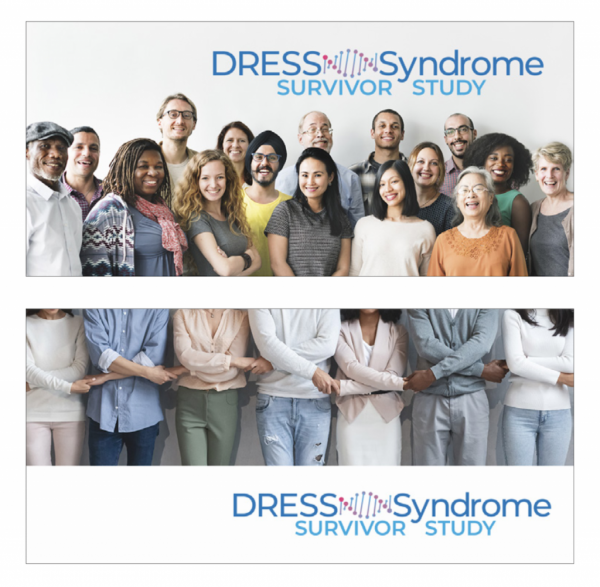
Are you a good fit for the Genetic Risk and Long-Term Outcomes Associated with Drug Reaction and Eosinophilia and Systemic Symptoms research study?
Complete the pre-screening survey today!
DRESS syndrome survivor study
What is drug reaction with eosinophilia and systemic symptoms (“DRESS”), also known as “drug-induced hypersensitivity syndrome”?
Drug reaction with eosinophilia and systemic symptoms (DRESS) is a life-threatening but potentially preventable drug-induced disease.
DRESS is related to common drugs such as anti-infective drugs (e.g., vancomycin and trimethoprim-sulfamethoxazole (Bactrim)), dapsone, minocycline, antiretrovirals (e.g., nevirapine, raltegravir, and others), anticonvulsants, drugs for mood disorders (e.g., lamotrigine, phenytoin, carbamazepine, and oxcarbazepine), and medications for gout (e.g., allopurinol) as well as many other drugs.
Strong genetic risk factors have been associated with DRESS, opening a pathway to prediction, prevention, and improved diagnosis. However, many drugs require further research to help discover new genetic markers, to understand additional genetic factors that explain why not everyone carrying the primary risk gene gets DRESS, and to increase the widespread availability of preventive and diagnostic genetic markers.
About the study
Working with the DRESS Syndome Foundation, CDSI is assembling one of the largest data and DNA biobanks of DRESS patients internationally. This biobank is used to identify the nature and risk for long-term complications of DRESS and genetic risk factors associated with drug-induced DRESS that will translate into improved pre-prescription preventative strategies and care for patients with the disease. This study was designed to enroll 200 patients who self-reported recovering from DRESS.
What are the primary aims of the study?
The primary aims of the DRESS syndrome survivor study are to identify genetic risk factors associated with drug-induced DRESS that will translate into improved pre-prescription preventive strategies and care of DRESS and to understand the long-term complications of DRESS.
What does the study require?
- No onsite visit is required
- Review of medical records that include the time you the diagnosis of DRESS was made and you received acute treatment. Since DRESS often has follow-up complications this may also include records from your dermatologist or other provider.
- Your records will be reviewed by a panel of DRESS experts
- You will be mailed an Oragene oral saliva DNA kit to provide a one-time saliva sample that will be send in a box ready to courier back to us. This will be used as a source of DNA for the genetic typing planned as part of the study.
Who can participate?
Adults and children who have self-identified as having DRESS related to a medication/drug they have taken can participate in this study. Eligible participants should be willing to sign an informed consent document to participate in a research study and provide medical records to the research study personnel.
Learn more
- Principal Investigator: Elizabeth Phillips, MD
- Email drugsafetyresearch@vumc.org for more information
- Take survey

